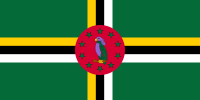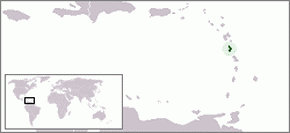 Dominica, (pronounced /dəˈmɪnɪkə/; French: Dominique) officially the Commonwealth of Dominica, is an island nation in the Caribbean Sea. To the north-northwest lies Guadeloupe, to the southeast Martinique. Its size is 754 square kilometres (291 sq mi) and the highest point in the country is Morne Diablotins, which has an elevation of 1,447 metres (4,747 ft). The Commonwealth of Dominica has an estimated population of 72,500. The capital is Roseau.
Dominica, (pronounced /dəˈmɪnɪkə/; French: Dominique) officially the Commonwealth of Dominica, is an island nation in the Caribbean Sea. To the north-northwest lies Guadeloupe, to the southeast Martinique. Its size is 754 square kilometres (291 sq mi) and the highest point in the country is Morne Diablotins, which has an elevation of 1,447 metres (4,747 ft). The Commonwealth of Dominica has an estimated population of 72,500. The capital is Roseau.
Dominica has been nicknamed the “Nature Isle of the Caribbean” for its seemingly unspoiled natural beauty. It is the youngest island in the Lesser Antilles, still being formed by geothermal-volcanic activity, as evidenced by the world’s second-largest boiling lake. The island features lush mountainous rainforests, home of many rare plant, animal, and bird species. There are xeric areas in some of the western coastal regions, but heavy rainfall can be expected inland. The Sisserou Parrot (also known as the Imperial Amazon), the island’s national bird, is featured on the national flag. Dominica’s economy is heavily dependent on both tourism and agriculture.
Christopher Columbus named the island after the day of the week on which he spotted it, a Sunday (dominica in Latin), November 3, 1493. In the next hundred years after Columbus’ landing, Dominica remained isolated, and even more Caribs settled there after being driven from surrounding islands as European powers entered the region. France formally ceded possession of Dominica to the United Kingdom in 1763. The United Kingdom then set up a government and made the island a colony in 1805.
The emancipation of African slaves occurred throughout the British Empire in 1834, and, in 1838, Dominica became the first British Caribbean colony to have a legislature controlled by an African majority. In 1896, the United Kingdom reassumed governmental control of Dominica, turning it into a Crown colony. Half a century later, from 1958 to 1962, Dominica became a province of the short-lived West Indies Federation. In 1978, Dominica became an independent nation.
Dominica is home to a wide range of people. Although it was historically occupied by several native tribes, the Arawaks and Kalinago Carib tribes remained by the time European settlers reached the island. ‘Massacre’ is a name of a river dedicated to the murders of the Native villagers by French and British settlers, because the river ran red with blood for days. Each (French and British) claimed the island and imported slaves from Africa. The remaining Caribs now live on a 3,700-acre (15 km2) territory on the east coast of the island. They elect their own chief. This mix of cultures is important to Dominica.
The Dominican economy depends on agriculture, primarily bananas, and remains highly vulnerable to climatic conditions and international economic developments. Tourism has increased as the government seeks to promote Dominica as an “ecotourism” destination and has developed a new tourism development plan with assistance from the EU. Hurricane Dean struck the island in August 2007 causing damages equivalent to 20 % of GDP.
In 2003, the government began a comprehensive restructuring of the economy – including elimination of price controls, privatization of the state banana company, and tax increases – to address Dominica’s economic and financial crisis of 2001-02 and to meet IMF targets. This restructuring paved the way for the current economic recovery – real growth for 2006 reached a two-decade high – and will help to reduce the debt burden, which remains at about 100% of GDP. In order to diversify the island’s production base, the government is attempting to develop an offshore financial sector and has signed an agreement with the EU to develop geothermal energy resources.
Notes from Wikipedia and Answers.com









